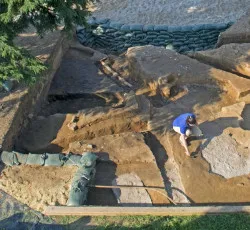In the 1850s, Ann Pamela Cunningham and the Mount Vernon Ladies’ Association began preserving the home of George Washington.
More than 160 years later, the work continues. The restoration of each room in the Mansion and each outbuilding is accomplished through the collaboration of experts in multiple fields, including architectural historians, archaeologists, carpenters, curators, conservators, and collections managers on Mount Vernon’s staff and craftspeople and colleagues from other historic sites.
As new documents and artifacts come to light and technological and analytical tools advance, we continually refine our understanding of Mount Vernon, the Washingtons, and life during the 18th century in order to give visitors accurate and engaging views of the past.

The Mount Vernon Ladies’ Association
George Washington’s home is owned and maintained by the Mount Vernon Ladies’ Association, the oldest national historic preservation organization in the United States.
Learn more
8 Facts about Preservation
Mount Vernon's preservation team is constantly working to restore and preserve George Washington's estate.
Learn moreCollections
Mount Vernon’s collections teach us about George Washington and bring his home and plantation to life.

Restoring Mount Vernon
Mount Vernon is one of the best documented and most complete examples of an estate from early America, but discovering, analyzing, and interpreting the mass of available evidence is an ongoing process.
Learn More
Historic Structures
There are four different types of standing historic structures at Mount Vernon: Original Structures, Reconstructions, Replicas, and MVLA and Period Support Structures. Each of these structures helps tell the story of life at Mount Vernon.
Learn more
Paint Analysis
The question of what color to paint each room in the Mansion has been asked since the 1860s. Today we use modern paint analysis to help answer the question.
Learn moreThe Restoration Process

Front Parlor
One of the most elaborately finished rooms in the house, the Front Parlor served as the primary entertaining space in the Mansion for most of the Washingtons’ lives.
Learn more
Blue Room
The room at the top of the stairs to the second floor – known to the Washingtons in the 1790s as the “Blue Room” was an exciting project to research, analyze, document, and restore.
Learn more
Washington's Red Roof
One of the most recognizable features at Mount Vernon is the iconic red roof of the Mansion, but the shingles were not always red.
Learn more
Terminology
Preservationists use a wide range of terminology in their work. Explore this list of some of their most commonly used terms and tools.
Learn more
Preservation Quiz
How much do you know about preservation at George Washington's Mount Vernon?
Find Out
Archaeology at the Slave Cemetery
Between May 2014 and the fall of 2017, archaeologists excavated a total of 211 5 x 5 ft. test units in the Slave Cemetery, and discovered 63 burial features.
Learn more
Ask An Archaeologist
Curious when and where you can see Mount Vernon's archaeology team at work? Want to understand what they are looking for?
Find Out
Native American Occupation
Archaeological investigations show Mount Vernon was an attractive location for Native communities for thousands of years prior to the arrival of the Washington family.
Learn more
Funding Mount Vernon
Joe Bondi, Senior Vice President of Development, explores how his staff supports Mount Veron's preservation efforts.
Learn moreNo Government Funds
Mount Vernon does not accept government funding. We are a 501(c)(3) nonprofit organization and rely solely upon patriotic individuals, foundations, and corporations to help preserve George Washington’s home and to educate visitors from all over the world.
Mount Vernon's Architecture
The Architecture Team leads the investigation and restoration of the estate’s physical fabric.
Learn more























